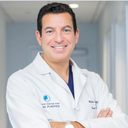Even with just local anesthesia, you should not drive home after blepharoplasty because the muscles that move your eye may be anesthetized, and your vision generally isn't that clear due to ointment and tearing. Also, many that use local anesthesia may use a mild oral sedative to go with it.






